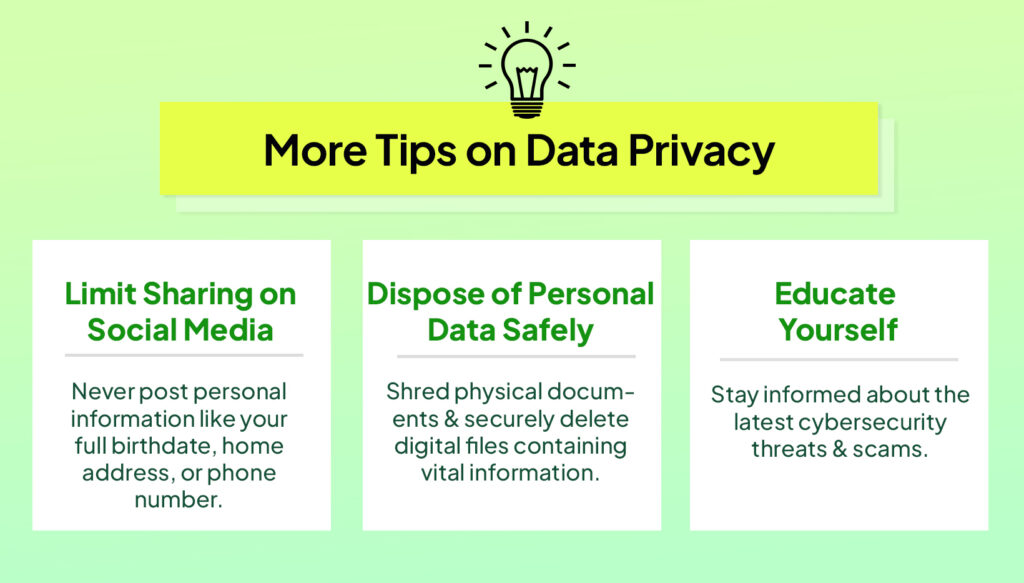
Top 7 Tips to Safeguard Your Digital Identity Like a Pro!
December 16,2024
Top 7 Tips to Safeguard Your Digital Identity Like a Pro!
Emily’s morning began with her usual routine—espresso in hand, scrolling through her emails. But then, a notification stuck her eye: “Your account password has been modified.”
Panicking, she discovered that her bank account had been drained and her social media accounts were locked. Someone had stolen her digital identity, leaving her broke financially.
Emily’s story is a harsh reminder to take your digital identity seriously. In today’s virtual age, where each click, post, and transaction matters, your personal records are generally under threat. Everyone can become a victim without the right online data protection and robust identity protection software programs.
But fret no longer—there are techniques to stay one step earlier. This blog provides the top 7 best practices for protecting virtual identification and suggests how software solutions like AVP Suite Total Security can enhance information privacy and cybersecurity.
So, without further ado, let’s dive into the blog.
Happy reading!
| Table of Contents!
Why Protecting Your Digital Identity Matters Who Are the Major Targets? Signs of Identity Theft How to Protect Your Digital Identity from Hackers and Fraud How AVP Suite Total Security Can Help |
Why Protecting Your Digital Identity Matters
The consequences of identity theft can be devastating. Victims regularly face monetary loss, emotional misery, and broken credit. In 2022, identity theft cost Americans over $56 billion, according to The Identity Theft Resource Center.
But defending your identity isn’t about avoiding economic damage—it’s about maintaining your sense of safety in an increasingly cyber-threatened world.
According to the Federal Trade Commission (FTC), identity theft cases skyrocketed by 113% between 2019 and 2021, with over 1.4 million reports in 2021 alone. But don’t worry—with the proper steps, you can safeguard your online identity.
Who Are the Major Targets?
We all can be affected by identity theft. However, certain age groups, especially those below 60, are more inclined to fall victim to it. These youngsters overshare on social media and prefer online transactions, and they are most likely the top targets.
The Javelin Strategy & Research report found that 47% of identity theft victims will be between 20 and 39 in 2022. Hackers are leveraging their digital identities, targeting accounts that are not adequately protected and have outdated software.
Related Read: What Personal Data Are Companies Tracking and How Can You Stay Safe?
Signs of Identity Theft
It’s essential to know the warning signs of identity theft. Here is a red flag:
- Suspicious Charges: Suspicious transactions on your bank statements.
- Suspicious Emails: Receiving money or statements from accounts you did not open.
- Credit Score Changes: A sudden, unexplained drop in your credit score.
- Locked Accounts: Accounts may be locked or receive a password change notification that you did not do.
How to Protect Your Digital Identity from Hackers and Fraud
Hackers thrive on getting sensitive information like your name, address, social security number, and financial information. Using this data, they can steal your identity, make unauthorized purchases, or even sell your identity on the dark web. Protecting your online information isn’t pretty much preserving your accounts safe—it’s approximately protecting your complete digital existence.
So, how will you maintain the privacy?
Follow these practical tips to stay secure:
-
Use Strong and Unique Passwords
Weak or reusable passwords are a hacker’s heaven. So, have complex passwords combined with uppercase, lowercase, numbers, and special characters. Avoid using easy-to-guess information like your name or date of birth. Besides, a password manager can help create and store a unique password for each account.
-
Enable Two-Factor Authentication (2FA)
Two-factor authentication includes an added layer of security to your account by ensuring a second verification step, such as a text message or biometric scan. Even if a hacker gets your password, 2FA makes it more difficult for them to access that information.
Read More: 9 Unmissable Reasons to Invest in Antivirus Protection
-
Be Cautious of Phishing Attempts
Phishing scams are one of the most common methods hackers use to steal identity information. Avoid clicking on suspicious links or downloading attachments from unfamiliar emails. Always verify the sender, especially when the email asks for sensitive information.
-
Use Secure Wi-Fi Networks
Public Wi-Fi networks are regularly unsecured, making them golden spots for hackers. Avoid accessing sensitive accounts or accomplishing financial transactions on public Wi-Fi. If you must use it, join through a virtual non-public community (VPN) for a stable internet connection and security.
-
Monitor Your Financial Accounts
Check your bank statements, credit reports, and online accounts regularly for any suspicious activities. Catching fraud early can prevent damage.
| Ready to Take Charge of Your Identity Protection?
Download AVP Suite Total Security today, foolproof your digital identity, and get peace of mind. |
-
Update Software Regularly
Outdated software programs can have vulnerabilities that hackers make the most of. Keep your operating system (OS), apps, and antivirus software updated to defend against the latest deadly cyber threats.
-
Invest in Identity Protection Tools
Comprehensive online data protection tools, like AVP Suite Total Security, can assist you in safeguarding your private data. Features like dark web monitoring, anti-tracking, and identity theft signals ensure you stay protected 24*7 around the clock.
Also Read: The Ultimate Guide to Internet Security Software
How AVP Suite Total Security Can Help
Your virtual identity is precious—don’t leave it vulnerable to hackers. You can ensure your sensitive information is safer by following the suggestions above and using AVP Suite Total Security.
Let’s see how AVP Suite protects you and provides ultimate cyber safety. Here’s how:
- Identity Protection Software: Monitors your digital footprint and alerts you to potential threats.
- Anti-Phishing Technology: Identifies and eliminates phishing attempts before they reach your inbox.
- Real-time data storage tools: Ensure your personal data is not shared without consent.
- Malware and Ransomware Defense: Protects against malware attacks that can compromise your identity.
- Safe Browsing Features: Block fake and unsafe websites that can steal your information.
With AVP Suite’s robust identity protection software, you can browse the web, shop online, and manage your accounts without worrying about emerging cyber threats.
Take the first step toward data protection security. Download AVP Suite Total Security today and safeguard your digital life!
Emily’s morning began with her usual routine—espresso in hand, scrolling through her emails. But then, a notification stuck her eye: “Your account password has been modified.”
Panicking, she discovered that her bank account had been drained and her social media accounts were locked. Someone had stolen her digital identity, leaving her broke financially.
Emily’s story is a harsh reminder to take your digital identity seriously. In today’s virtual age, where each click, post, and transaction matters, your personal records are generally under threat. Everyone can become a victim without the right online data protection and robust identity protection software programs.
But fret no longer—there are techniques to stay one step earlier. This blog provides the top 7 best practices for protecting virtual identification and suggests how software solutions like AVP Suite Total Security can enhance information privacy and cybersecurity.
So, without further ado, let’s dive into the blog.
Why Protecting Your Digital Identity Matters
The consequences of identity theft can be devastating. Victims regularly face monetary loss, emotional misery, and broken credit. In 2022, identity theft cost Americans over $56 billion, according to The Identity Theft Resource Center.
But defending your identity isn’t about avoiding economic damage—it’s about maintaining your sense of safety in an increasingly cyber-threatened world.
According to the Federal Trade Commission (FTC), identity theft cases skyrocketed by 113% between 2019 and 2021, with over 1.4 million reports in 2021 alone. But don’t worry—with the proper steps, you can safeguard your online identity.
Who Are the Major Targets?
We all can be affected by identity theft. However, certain age groups, especially those below 60, are more inclined to fall victim to it. These youngsters overshare on social media and prefer online transactions, and they are most likely the top targets.
The Javelin Strategy & Research report found that 47% of identity theft victims will be between 20 and 39 in 2022. Hackers are leveraging their digital identities, targeting accounts that are not adequately protected and have outdated software.
Related Read: What Personal Data Are Companies Tracking and How Can You Stay Safe?
Signs of Identity Theft
It’s essential to know the warning signs of identity theft. Here is a red flag:
- Suspicious Charges: Suspicious transactions on your bank statements.
- Suspicious Emails: Receiving money or statements from accounts you did not open.
- Credit Score Changes: A sudden, unexplained drop in your credit score.
- Locked Accounts: Accounts may be locked or receive a password change notification that you did not do.
How to Protect Your Digital Identity from Hackers and Fraud
Hackers thrive on getting sensitive information like your name, address, social security number, and financial information. Using this data, they can steal your identity, make unauthorized purchases, or even sell your identity on the dark web. Protecting your online information isn’t pretty much preserving your accounts safe—it’s approximately protecting your complete digital existence.
So, how will you maintain the privacy?
Follow these practical tips to stay secure:
1. Use Strong and Unique Passwords
Weak or reusable passwords are a hacker’s heaven. So, have complex passwords combined with uppercase, lowercase, numbers, and special characters. Avoid using easy-to-guess information like your name or date of birth. Besides, a password manager can help create and store a unique password for each account.
2. Enable Two-Factor Authentication (2FA)
Two-factor authentication includes an added layer of security to your account by ensuring a second verification step, such as a text message or biometric scan. Even if a hacker gets your password, 2FA makes it more difficult for them to access that information.
Read More: 9 Unmissable Reasons to Invest in Antivirus Protection
3. Be Cautious of Phishing Attempts
Phishing scams are one of the most common methods hackers use to steal identity information. Avoid clicking on suspicious links or downloading attachments from unfamiliar emails. Always verify the sender, especially when the email asks for sensitive information.
4. Use Secure Wi-Fi Networks
Public Wi-Fi networks are regularly unsecured, making them golden spots for hackers. Avoid accessing sensitive accounts or accomplishing financial transactions on public Wi-Fi. If you must use it, join through a virtual non-public community (VPN) for a stable internet connection and security.
5. Monitor Your Financial Accounts
Check your bank statements, credit reports, and online accounts regularly for any suspicious activities. Catching fraud early can prevent damage.
Ready to Take Charge of Your Identity Protection?
Download AVP Suite Total Security today, foolproof your digital identity, and get peace of mind.
Claim Your Free Trial!
6. Update Software Regularly
Outdated software programs can have vulnerabilities that hackers make the most of. Keep your operating system (OS), apps, and antivirus software updated to defend against the latest deadly cyber threats.
7. Invest in Identity Protection Tools
Comprehensive online data protection tools, like AVP Suite Total Security, can assist you in safeguarding your private data. Features like dark web monitoring, anti-tracking, and identity theft signals ensure you stay protected 24*7 around the clock.

Also Read: The Ultimate Guide to Internet Security Software
How AVP Suite Total Security Can Help
Your virtual identity is precious—don’t leave it vulnerable to hackers. You can ensure your sensitive information is safer by following the suggestions above and using AVP Suite Total Security.
Let’s see how AVP Suite protects you and provides ultimate cyber safety. Here’s how:
- Identity Protection Software: Monitors your digital footprint and alerts you to potential threats.
- Anti-Phishing Technology: Identifies and eliminates phishing attempts before they reach your inbox.
- Real-time data storage tools: Ensure your personal data is not shared without consent.
- Malware and Ransomware Defense: Protects against malware attacks that can compromise your identity.
- Safe Browsing Features: Block fake and unsafe websites that can steal your information.
With AVP Suite’s robust identity protection software, you can browse the web, shop online, and manage your accounts without worrying about emerging cyber threats.
Take the first step toward data protection security. Download AVP Suite Total Security today and safeguard your digital life!
Strengthen your security with AVP Suite before it’s too late!
Try AVP Suite for Free!






Precisely what I was searching for, thankyou for posting.